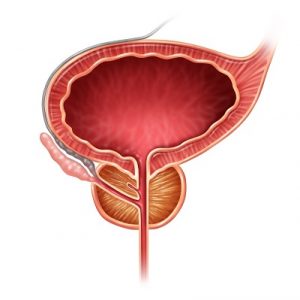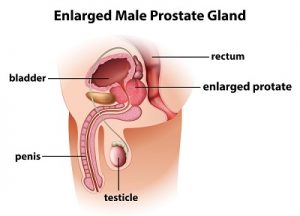Prostate Health
 There are not many problems that can relate to the prostate. According http://kidney.niddk.nih.gov, the prostate has a specific set of functions, “The prostate is part of a man’s sex organs. It’s about the size of a walnut and surrounds the tube called the urethra, located just below the bladder.
There are not many problems that can relate to the prostate. According http://kidney.niddk.nih.gov, the prostate has a specific set of functions, “The prostate is part of a man’s sex organs. It’s about the size of a walnut and surrounds the tube called the urethra, located just below the bladder.
The urethra has two jobs: to carry urine from the bladder when you urinate and to carry semen during a sexual climax, or ejaculation. Semen is a combination of sperm plus fluid that the prostate adds.”
So, what can go wrong with a prostate? Well, first, it can become enlarged. “For men over 50, the most common prostate problem is prostate enlargement. This condition is also called benign prostatic hyperplasia(BPH). Older men are at risk for prostate cancer as well, but this disease is much less common than BPH. “
Another possibility is prostatitis, especially for men under the age of 50, “Prostatitis means the prostate might be inflamed or irritated. If you have prostatitis, you may have a burning feeling when you urinate, or you may have to urinate more often. Or you may have a fever or just feel tired.” Continue reading
 According to a New York Times article, “An enlarged prostate means the gland has grown bigger. Prostate enlargement happens to almost all men as they get older. As the gland grows, it can press on the urethra and cause urination and bladder problems. An enlarged prostate is often called benign prostatic hyperplasia (BPH) or benign prostatic hypertrophy. It is not cancer, and it does not raise your risk for prostate cancer.”
According to a New York Times article, “An enlarged prostate means the gland has grown bigger. Prostate enlargement happens to almost all men as they get older. As the gland grows, it can press on the urethra and cause urination and bladder problems. An enlarged prostate is often called benign prostatic hyperplasia (BPH) or benign prostatic hypertrophy. It is not cancer, and it does not raise your risk for prostate cancer.”
There are many causes of an enlarged prostate, “The actual cause of prostate enlargement is unknown. Factors linked to aging and the testicles themselves may play a role in the growth of the gland. Men who have had their testicles removed at a young age (for example, as a result of testicular cancer) do not develop BPH. Similarly, if the testicles are removed after a man develops BPH, the prostate begins to shrink in size.”
The symptoms are, “Lower urinary tract symptoms (LUTS) are categorized either as voiding (formerly called obstructive) or storage (formerly called irritative) symptoms. BPH is often, but not always, the cause of LUTS, especially the voiding symptoms. Continue reading






